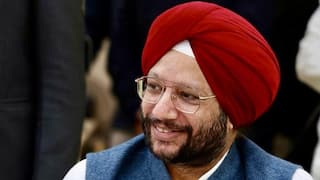Amazon Downplays ‘East India Company 2.0’ Flak, Highlights ‘Positive Impact On Small Businesses’
Underlining its export program, Amazon said that it had helped over 70,000 Indian businesses sell ‘made in India’ products across the world.

New Delhi: Attempting to downplay the criticism by Rashtriya Swayamsevak Sangh (RSS) affiliate magazine Panchjanya, e-commerce giant Amazon on Monday highlighted its positive impact on small businesses, including sellers, artisans and delivery and logistics partners.
“During the pandemic three lakh new sellers joined us... of which 75,000 were local neighbourhood shops (dukaans) from 450+ cities (selling) furniture, stationery, consumer electronics, beauty products, mobile phones, garments, medical products...,” the e-commerce company said in a statement.
READ: Aditya Birla Sun Life AMC IPO: Check Subscription Date, Price & All You Need to Know
Underlining its export program, Amazon said that it had helped over 70,000 Indian businesses sell ‘made in India’ products across the world.
“Amazon’s exports program is witnessing rapid momentum... today there are 70,000+ exporters from metros as well as Tier II, III and IV cities, selling crores of 'made in India' products to customers in 200 countries across the world - truly taking (it) global,” the e-commerce said.
The statement from Amazon came as the United States-headquartered e-commerce company has been called “East India Company 2.0” in the latest cover story by Panchjanya.
Panchjanya editor Hitesh Shankar earlier in the day tweeted an image of the new cover, which features Amazon CEO Jeff Bezos and the headline “#Amazon: East India Company 2.0”.
“Panchjanya means talk of India. Read the next issue. What wrong does Amazon do that it needs to bribe? Why do the people consider this giant company a threat to indigenous entrepreneurship, economic freedom and culture?” he tweeted with the new cover.
The cover story, which has been titled “East India Company 2.0”, accuses Amazon of corrupt practices.
“Actually, Amazon too wants to have sole rights on the Indian market. For this it has started taking steps to encircle the political, economic and individual freedom of people here,” the story says.
The cover story, written by the bureau of Panchjanya, also accused the retail giant for allegedly assaulting Hindu values through Prime Videos.
“It is accused of floating shell companies to capture the e-market platform, of bribing to have policies in its favor, and of airing programmes opposed to Indian culture through Prime Videos,” the story adds.
The cover story alleges that while Amazon invested in India with a promise to help the small traders get a larger platform to sell products, it actually floated its own companies to do the same.
“The company floated supplier entities such as Cloudtail and Apiria in which it had significant stake and indirect control,” the story says claiming the two companies account for 35 per cent of all Amazon business.
The article has compared Amazon’s tactics with the East India Company.
“Today the same thing is being done by foreign companies. Amazon is now stuck in such a controversy. Following cognizance of certain anti-Hindu content in programs such as Tandav and Paatal Lok on its OTT platform Prime Videos by the Ministry of Information and Broadcasting and some state governments, the company has apologised,” the article says.
“The people had alleged that Prime Videos is regularly airing such shows in which Hindu deities are made fun of and family values are assaulted,” the article adds.
Stressing on a “zero-tolerance” policy towards corruption, the Central government had last week said it will investigate the allegation against firm's legal representatives for their role in allegedly bribing the Indian officials.
The RSS affiliate magazine had earlier this month carried a cover story on Infosys in which it accused the company of supporting “tukde-tukde gang”.
Taking on Infosys over glitches in the GST and Income Tax portals developed by it, the magazine wondered that whether any “anti-national power is trying to hurt India’s economic interests through it”.
Related Video
Uttarakhand News: Winter Chill Grips North India; Kedarnath Dham Covered in Snow





































